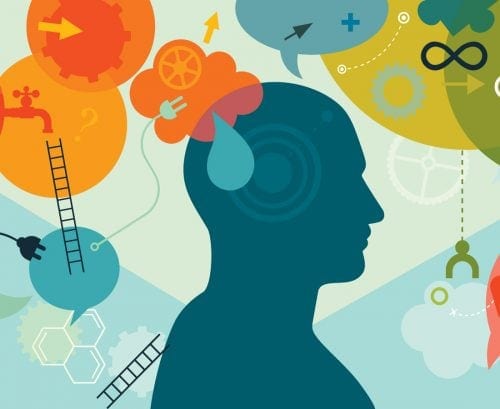
The science confirms what we’ve known instinctively for a long time. There are links between our emotional and physical health. HFG editor-at-large Niki Bezzant investigates.
Our bodies are, as we know, finely-tuned and complex machines, capable of amazing feats. There’s also a vast amount we don’t know about how our bodies work. The links between mind and body might still be the most mysterious area of all, but science is always discovering more.
It’s clear to most of us, and to science, that our moods can affect how we feel, physically. When we’re happy, we tend to feel lighter, brighter and more energetic – think of the feeling of being in love.
Conversely, when we are down after a setback, such as a breakup, we feel unmotivated, tired and, sometimes, physically unwell. We can also turn to unhealthy behaviours, such as drinking too much and junk food binges.
This is natural, according to Lindsey Coup, a New Zealand registered occupational therapist who specialises in mental health. “It is important to recognise that feeling unmotivated is part of feeling down”, she says. “We [turn to junk food and alcohol] because we may not be able to find any positive emotions or motivation for normally enjoyable activities. Sometimes it may be because we don’t know of any other ways to cope with the stress, and the drinking is used as a coping mechanism or form of self-medication.”
Unfortunately, this can cause a bit of a downward mood spiral. A 2012 study published in Appetite, looking at the relationship between food and mood in 44 students, found the more energy, saturated fat and sodium consumed by research subjects, the more negative moods were reported two days later.
Emotional eating
Our reactions to difficult situations that cause low mood – and how that affects our food choices – may also depend on what kind of eater we are. Psychology researchers in the past have classified people using what they call an Emotional Eating Scale. Previous research has found people who are classified as ‘emotional eaters’ tend to react to negative emotions by overeating.
However, recent research has also found emotional eaters tend to overeat in response to a happy mood, too. We’re a lot more complicated than we know, it seems.
Emotional eating is common, says dietitian Brad Brosnan, who specialises in mental health. It’s often tied to stress. “[It’s] that feeling after a rough day in the office or from being stressed for that deadline. We tend to focus on what’s close to us physically and in the ‘here and now’ to help get us through in that moment, rather than thinking about our long-term health and wellbeing goals.”
When we’re in a more positive, grounded mood, Mr Brosnan says, we have more of a tendency to look towards our long-term health goals and do a workout or limit the foods we know are not great for us. “Remember that these urges can be normal,” he says. “The important aspect is to notice and understand your current mood and try to make decisions based on your long-term goals. The more you do this, the more confidence you will gain in your willpower and overall health.”
Ms Coup agrees it’s important not to try to numb our sad or negative feelings. “Instead of avoiding negative emotions and trying to ‘numb’ them, we can work on noticing them and come up with solutions to cope with them,” she says. “Give yourself time to process and work through these challenges by using positive coping strategies or enjoyable activities.”
This can take weeks, months or years to feel comfortable doing, Ms Coup says, but ‘giving yourself time to work through and notice the ups and downs of emotions is the best gift you can give yourself, [because] it will help strengthen your self-concept and support the development of positive thinking practices for the future’.
Ms Coup recommends thinking of activities you have enjoyed in the past, such as meeting with friends, going to yoga, walking the dog, drawing or artwork. “Get creative, cook healthy meals, try a new recipe, use mindfulness,” she says.
It’s also important to think about speaking to a health professional for more individual advice if you notice you have more than just the ‘Sunday blues’ and your mood is affecting you long term.
The worried well
While it’s important to focus on our long-term health goals, can we go too far? Can focus on health turn to anxiety? “Having some anxiety about our health can make us more conscious about taking care of ourselves,” Ms Coup says. “It may mean we are proactive in scheduling regular healthcare appointments and check-ups for more preventative care. Anxiety is a normal human emotion and can help us to complete tasks, if it does not become heightened.”
For example, this kind of anxiety can help us to positively avoid situations we may associate with being bad for our health, such as avoiding smoking for fear of developing a respiratory issue, or limiting sugary foods and drinks to avoid gaining weight.
However, it can also, sometimes, have a negative effect. Ms Coup says if the fear or anxiety becomes intense, ‘we may find it difficult to rationally make a decision because the fear is so strongly present within our belief system’.
She goes on to say that the less anxious we are about our health, the easier it will be to listen to and weigh up the risks, rewards and consequences of the choices we make for our own health. “Understanding your own relationship with your health and making informed decisions that are right for you will be easier when you are not feeling overly anxious,” she says.
Depression and obesity: The links
Another area where mood and health are linked is depression. Experts know obesity is often associated with depression, as it is with other health issues.
A 2018 study in the Journal of Affective Disorders found people with obesity and mood disorders or depression were more likely than people with obesity but without mood disorders to report a number of other health problems, including hypertension and stomach ulcers. But it seems there’s no clear answer to the question of which comes first. “Depression is generally multi-faceted and often not linked to one factor,” Ms Coup explains.
Mr Brosnan agrees, “Obesity and depression can be an intertwined challenge. Both can be isolating, stigmatising and can cause serious health effects. When one occurs, the other often develops. Having a higher BMI or being obese continues to be identified as a risk factor for developing depression.”
There is still much to learn about that link, he says. In the meantime, seeking professional help is always a good start if we’re feeling unable to cope.
Tips for making good choices, no matter your mood:
Work on awareness of who you are
When we’re self-aware, it’s easier to see where our thoughts and emotions are guiding us. “The more you know yourself, the more you will be able to understand your feelings and responses to situations, no matter your mood,” Ms Coup says. “Give yourself time to work on this. It’s not something that anyone can achieve overnight.”
Remove distractions such as junk food, alcohol and digital devices.
“Replace these distractions with more meaningful and enjoyable activities or relationships,” Mr Brosnan says. “These could include exercising, using mindfulness, cooking or meeting with a friend or family member.”
Be patient and consistent with your efforts.
Don’t expect the world to change and have all the answers after one yoga or reflection session, Ms Coup says. “Remember to be consistent in doing one thing every day, even if it is just a small thought or change in thinking. Consistency is the key to changing habits and forming positive strategies. Give yourself time to continue learning about yourself. It is a life-long journey.”
Gut feelings: The links between gut and mood
If you’ve ever had butterflies in your tummy, or grumbling in your gut when you’re stressed or anxious, you’ve experienced how our brain and gut are connected. We have a network of 100 million neurons (nerve cells) stretching from our oesophagus to our colon, forming what’s known as our ‘enteric brain’. This gut-brain is in constant communication with the brain in our head by way of the vagus nerve, which starts at the back of the skull and ends in the abdomen, connecting with the ears, voice box, heart, lungs and stomach. Nerve cells send and receive messages via chemical compounds that can alter these signals, causing both positive and negative effects, including affecting our moods.
On top of that, the trillions of bacteria living in our gastrointestinal tract also produce and release feel-good chemicals and stress chemicals. Researchers are now exploring how probiotics, prebiotics and other interventions can affect our gut bacteria, raising the prospect of ‘psychobiotics’ – treatments for mood disorders targeting the gut.
With all of this in mind, it makes sense to take care of our gut bacteria via what we eat. That means keeping processed foods and alcohol to a minimum, including prebiotic foods, such as whole grains, legumes and cooked and cooled potatoes, and trying some fermented foods, such as sauerkraut, kimchi and kombucha. We also do our gut a favour by exercising regularly and finding ways to keep a lid on stress.
For more on mood read these:
www.healthyfood.com










